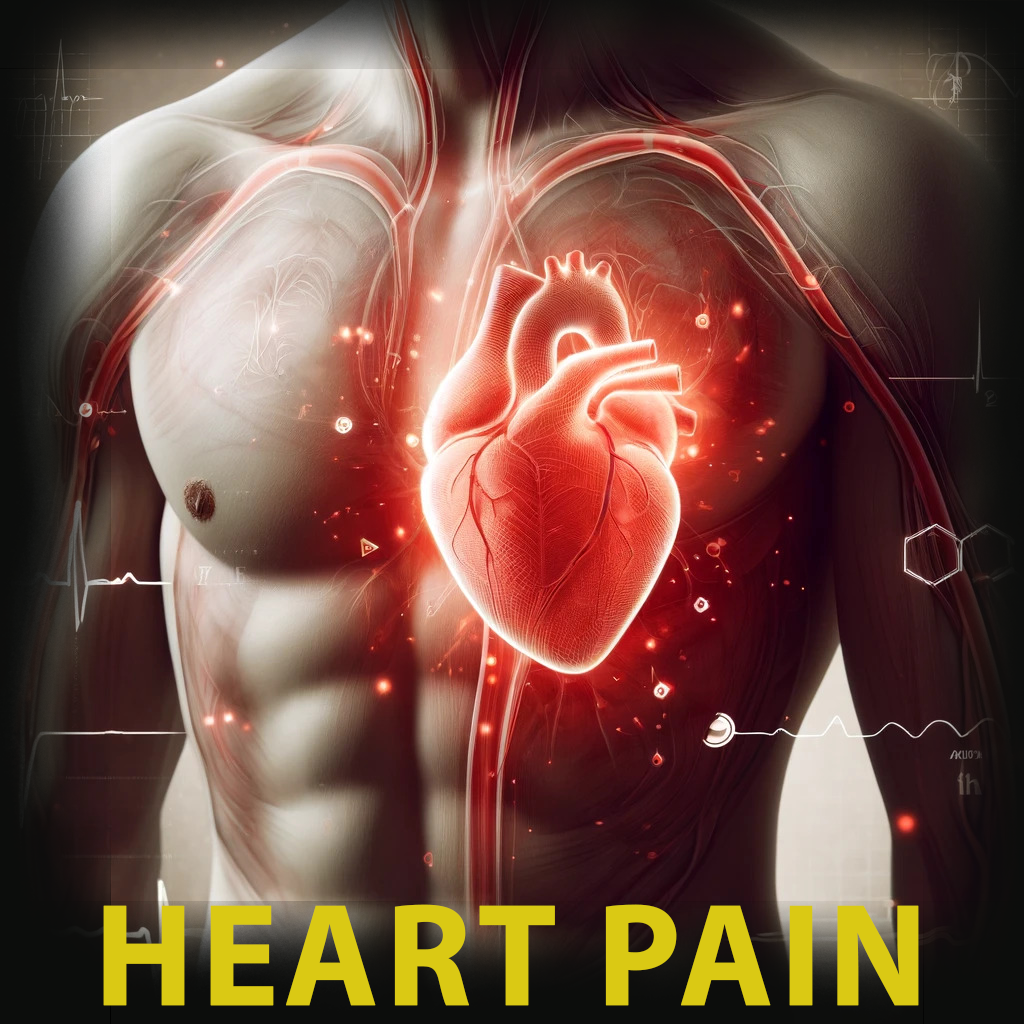Heart pain (chest pain or angina), as a symptom, may feel mild to extreme, crushing — potentially sharp. It’s one of the top reasons that people present for emergency medical attention. Nevertheless, not all pain of the heart is from the heart. Awareness of what causes it, the symptoms and how to deal with it adequately can assist you manage your anxiety efficiently.
What is Heart Pain?
Heart pain refers to any chest discomfort or pain that may or may not involve the heart. The pain may be mild or severe (or anywhere in between), acute or chronic, and sharp or dull. Although heart pain usually warns of possible trouble with the heart, it can also come from elsewhere (other organs or muscles) or cause other things.
Pain from the heart is usually felt as pressure, squeezing or burning in the chest. It can spread to other parts of the body, including the arms, back, neck, jaw or stomach. Being able to distinguish cardiac from non-cardiac chest pain is essential to effective treatment.
Causes of Heart Pain
There are many possible causes of heart pain that can be placed into two general categories: cardiac and non-cardiac origin.
1. Cardiac Causes
- Coronary Artery Disease (CAD): Coronary Artery Disease (CAD): CAD happens when the vessels nourishing the heart are narrowed or blocked because plaque builds up in them, causing chest pain (angina) especially with effort or stress.
- Heart Attack (Myocardial Infarction): This happens when blood flow to the heart is entirely blocked. Attack CHD leads to agonizing chest pain usually with signs of dyspnea / shortness of breath, nausea and sweating.
- Pericarditis:
Sharp, stabbing chest pain associated with inflammation of the sac surrounding the heart (pericarditis) — often worse when laying down or breathing deeply.
- Aortic Dissection: An avulsion of the inner layer of the aorta gives rise to sudden and severe chest pain, usually in watermelon radian to the back. This is a medical emergency which can prove fatal.
2. Non-Cardiac Causes
- Gastroesophageal Reflux Disease (GERD): This includes symptoms like burning in the chest (heartburn) because acid reflux can imitate heart pain.
- Musculoskeletal Issues: Local pain due to strained chest muscles or a rib injury can be confused with heart pain.
- Lung Conditions: Conditions that can cause chest pain with heart-like characteristics: Pneumonia, pulmonary embolism or pleuritis
- Anxiety or Panic Attacks: Stress and anxiety can lead to tightness in the chest, palpitations or a sharp pain.
- Shingles: Shingles leads to localized chest pain that can feel sharp, which occurs before a rash.
Symptoms Associated with Heart Pain
Chest pain can present in different forms but it is important to identify signs of a heart-related issue:
-
Feeling of pressure, heaviness or constriction in the chest
-
Discomfort that spreads to the arms, shoulders, neck or jaw
- Shortness of breath
-
Excessive sweating, feeling sick or faint
- Fatigue or weakness
A non-cardiac chest pain is usually more of a sharp and focused sensation and typically gets worse with exercise, deep breathing or eating.
When to Seek Medical Attention
Any heart pain-whether new, unexplained or extreme-should be taken seriously. If any of these symptoms are present, seek medical attention:
-
Severe chest pain that comes on suddenly, especially if you find it difficult to breathe.
-
Risk factor: Pain in arms, back, neck or jaw
- Dizziness, fainting, or confusion
-
Chest pain accompanied by sweating, nausea or vomiting
Such symptoms can point to a heart attack or other potentially fatal conditions.
Diagnosis of Heart Pain
If you go to see a healthcare provider because of heart pain, they will first conduct a detailed workup that includes:
- Medical History and Physical Exam: In order to determine risk factors such as age, family history or a smoking or high blood pressure.
- Electrocardiogram (ECG): It identifies heart rhythm abnormalities by recording electrical activity of the heart.
- Blood Tests: Identify heart attack markers.
- Imaging Tests: Chest X-rays, echocardiograms, or CT scans help visualize possible defects.
- Stress Tests: Examine your heart under stress.
Treatment for Heart Pain
The treatment for heart pain varies depending on the cause:
1. Cardiac Treatments
- Medications: Drugs such as nitrates, aspirin, beta-blockers or statins are often given for diseases like angina or CAD.
- Procedures:In the case of blocked arteries, angioplasty or bypass surgery may be needed to restore blood flow.
- Lifestyle Changes: Abrupt smoking cessation should be advised together with a heart-friendly diet and regular activity.
2. Non-Cardiac Treatments
- Antacids or Proton Pump Inhibitors (PPIs): For acid reflux-related pain.
- Pain Relievers: For pain caused by musculoskeletal issues, or shingles.
- Anxiety Management: Chest pain related to stress will be addressed with therapy or medications.
Preventing Heart Pain
Some preventive means can help avert heart pain:
-
Avoid saturated fatty foods and eat more fruits, vegetables and whole grains.
-
Engage in physical activity to strengthen the heart and improve circulation.
-
Control stress by means of mindfulness, reflection, or various other practices.
-
Do not smoke and drink as little alcohol as possible.
-
Keep blood pressure, cholesterol and diabetes under control.
Conclusion
Heart pain is a symptom that should never go unheeded, as it may suggest a grave underlying condition. Not all chest pain is heart-related, but the only way to know is for a healthcare provider to do tests. Taking the right step when one is having a pain related to heart can be saved his or her life.
However, by knowing what can cause you to develop lipid plaques and taking preventive steps in your life, you will be able to decrease the possibility of developing them, as well as improve the health condition of your heart. Better safe than sorry, when in doubt of your signs visit the doctor to address a concern. There is too much of a gamble with your heart.

1 thought on “Heart Pain: Causes, Symptoms, and When to Seek Help”